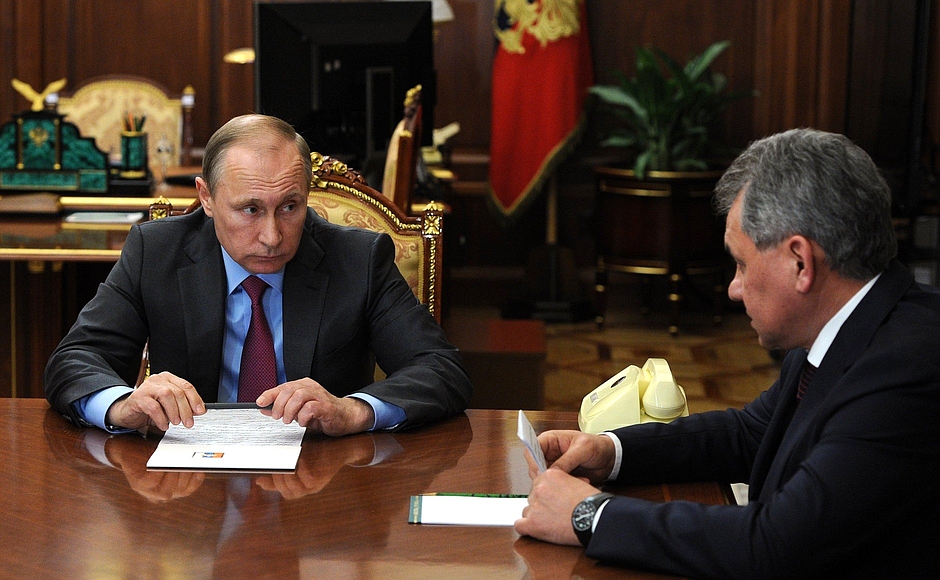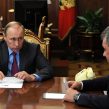
Putin’s Not-Quite-Withdrawal Signifies a Strategic Retreat
Publication: Eurasia Daily Monitor Volume: 13 Issue: 55
By:

A week after President Vladimir Putin’s surprise announcement (on March 14) of the partial withdrawal of Russian forces from Syria, the parameters of this strategic maneuver are becoming clearer, but the motivations remain subject to second-guessing (see EDM, March 17). US Secretary of State John Kerry will be going to Moscow in a few days, and the Russian foreign ministry expressed hope that discussions on Syria would lead to a “normalization” of bilateral relations (Newsru.com, March 19). US President Barack Obama called Putin after midnight last Monday to confirm that the reduction of the six-month-long Russian intervention was for real. But even now, the White House remains cautious about commenting on the significance of this self-restraint (Rbc.ru, March 15). Meanwhile, the United Kingdom’s Foreign Secretary Philip Hammond was far less circumspect, arguing, to the great chagrin of Russian officials, that Putin deserves no credit for stopping the bombing of Syrian schools and hospitals—especially since that halt has only been partial (Moskovsky Komsomolets, March 16).
The Kremlin’s decision to use the window of opportunity presented by the three-week-old ceasefire deal was perfectly sensible; yet, Putin did not appear to enjoy making this call. Even in the carefully doctored official video, he is visibly nervous and twitchy while listening to the “mission accomplished” report from Defense Minister Sergei Shoigu (Kremlin.ru, March 14). Besides being out of character for Putin, retreat involves particular risks. So while several squadrons of Russian jets arrived home safely, the remaining forces could be exposed to attacks by suddenly emboldened rebels (Rbc.ru, March 19). The Russian High Command has ordered to continue selective strikes, but the downing of a Syrian MiG-21 by a portable surface-to-air missile has demonstrated a new level of risk in the air campaign (Vedomosti, March 13). Moscow maintains that the Russian Air Force grouping at the Hmeymim airbase could be quickly reinforced if needed, but the element of surprise is now lost, and casualties could be higher than in the past months, while the public support for the continued operation is certain to be lower (Rosbalt, March 17).
Cold risk assessments alone were unlikely to have compelled Putin to give the marching orders. And the timing of the announcement (while useful in terms of “outfoxing” Obama) is still rather odd from the point of view of influencing the course of the civil war in Syria (Forbes.ru, March 15). Bashar al-Assad’s forces have gained in strength and morale, but not to such a degree that they can sustain their rather moderate gains without continued Russian air support (Slon.ru, March 16). The Russian withdrawal was announced right on the eve of the Geneva peace talks; and Moscow’s aim was certainly not to give more confidence to the rebels of various persuasions, who are demanding al-Assad’s departure with firm support from Turkey and Saudi Arabia. Ankara and Riyadh, in particular, were surprised with the demonstrated lack of Russia’s staying power (Gazeta.ru, March 15). If a beginning of an end to the Syrian catastrophe is indeed negotiated in Geneva (a tall order, certainly), Russia’s influence will shrink further because it has nothing to contribute to the, as yet, hypothetical peace-building process.
One plausible explanation for Putin’s deliberately inexplicable decision-making can be found in Russia’s far-from-trust-based relationship with Iran. One of the key elements of Putin’s grand plan for turning the course of the Syrian war was the combination of a Russian air campaign with a sizeable ground offensive by Iranian expeditionary corps. But with the latter in short supply, al-Assad’s forces achieved only minor success in the battle for Aleppo, which Putin still had to present as a decisive victory (Politcom.ru, March 15). What signified an even greater “stab in the back” (in Putin’s view) was Iran’s flat-out refusal to join the dubious initiative to “freeze” global oil production. The Kremlin engaged in desperate talks with Saudi Arabia and other members of the Organization of the Petroleum Exporting Countries (OPEC) in the hope that a joint commitment (even if just verbal) not to increase deliveries to the saturated international market would push the oil price up a few dollars. But Tehran has rebuffed such cartel intrigues (RIA Novosti, March 14). Indeed, the Iranian leadership is keen to juggle opening up to the West with new missile tests. Putin has nothing against the latter (the delivery of S-300 surface-to-air missiles has been again confirmed) but feels betrayed by the former (Vedomosti, March 11).
Regional stakeholders in the Syrian disaster are not necessarily impressed with Putin’s alleged tactical acumen, and they have good reasons to believe that the Russian intervention will be just a brief episode in the long transformation of the war zone that stretches from Lebanon to Iran (Novaya Gazeta, March 14). What matters most in this perspective are the fast-shrinking resources available to Moscow for possible further experiments with power projection—and the six quarters of economic contraction so far show no signs of plausible recovery (Nezavisimaya Gazeta, March 15). For now, nothing resembling a coherent anti-crisis plan has emerged from the president’s brainstorming sessions with his economic advisors (Gazeta.ru, March 13). Rather, the reality of a protracted decline is apparently becoming internalized, as illustrated by the directive to cut defense expenditures by 5 percent—while not a huge cut, it nonetheless represents a major departure from the government’s recent readiness to uphold the ambitious goals of rearmament at any cost (Vedomosti, February 19). In this context, Putin’s acknowledgement that the Syrian intervention was indeed a costly endeavor and not combat training on the cheap amounts to a reluctant retreat from the position of imagined omnipotence (Rbc.ru, March 17).
Putin has found it opportune recently to warn against a “dizziness from success”; but in fact, Russia is sinking into a depression from degradation (Slon.ru, March 15). Russians remain fearful of change—though are also suspicious that the change they fear is already upon them. The only recipe from this unhealthy angst has been distraction, and now the Kremlin has to invent a new one—preferably before Russia’s remaining “footprint” in Syria brings home a second painful setback (the first one was the downing of a Russian bomber by a Turkish fighter last November). The problem is not only that the costs of producing effective distractions has become barely affordable but also that each of the previous distractions remains a burden and a liability. Putin has become a hostage to his own surprises and has no way of knowing how the next one may backfire.




